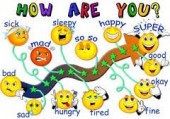Teaching Kids to Cope with Depression
Unfortunately kiddos get depressed too. Sometimes it is a chemical imbalance, clinical depression that may benefit from medication. But other times it is situational, environmental, or an inability to handle what is going on around them. Telling them to “stop” doing a negative behavior is not enough. What they need is for us to teach them and show them what to do instead.
Helping Kids Know What They Are Feeling
Kids, teens, and even adults don’t always put in words what is going on with them, but rather show it in their behavior. Irritable, fussy, whiney, weepy may actually mean tired, hungry, worried, sad, scared, lonely. But without knowing words for feelings or how to express them, or whom to express them to, you are going to get mixed messages. Start early teaching kids the names for emotions. If a child takes a toy from another child, you might redirect and include the words, “are you feeling jealous? Yes, sharing can be hard but it’s a nice thing to do with our friends.” If your child is crying because she wasn’t invited to the party, comfort her but also include something like “I have a hard time feeling disappointed also.” Introducing young people to more accurate terms for their emotions will help them communicate and identify how to specifically cope with those emotions.
Teaching Coping Skills to Kids
Stop doing that. Don’t cry. Calm down. Don’t be mad. You are overreacting. These are statements we often tell kids and teens when they are upset and acting out. But while these statements tell them what not to do, they don’t teach them what healthy strategies they could do in the circumstances. Remember when your toddler was playing with something they shouldn’t have? You would offer them a more appropriate toy in exchange to distract them. Use this strategy also with coping with emotions. Hand them the skills they need in the moment. “I can see you are getting frustrated with your sister. Why don’t you go take a break and have a warm bath to relax?” “I understand you don’t like my answer right now but if you continue to stand here we will argue and you will be in more trouble. How about you spend a few minutes in your room writing about why this is upsetting you so much and then maybe we can discuss it calmly.”
Kids Learn What They Live
We must also model healthy coping styles. Anyone who has heard their child repeat their own bad words knows this is true. Start with yourself and have the whole family begin stating emotions more accurately and practicing healthier ways to cope. Play the alphabet game and see if you can name an emotion for every letter. Make a list of positive and negative ways to cope and post on the fridge or somewhere everyone can see. And give praise for when the new ways are utilized so it gets reinforced. This will take practice for everyone, but is well worth it.
APA Reference
Merz, A.
(2012, August 8). Teaching Kids to Cope with Depression, HealthyPlace. Retrieved
on 2026, January 13 from https://www.healthyplace.com/blogs/copingwithdepression/2012/08/teaching-kids-to-cope-with-depression
Author: Amie Merz, LPC, NCC
Excellent Article. I agree. We need to talk to our kids on a one to one basis and show and teach them ways to cope when they feel down. Family activities and encouraging them to get out in the community might also help and influence more positivity.
Anyway, depression in childhood age isn't an exception, it is indeed a common emotional disorder that clinically shows atypical manifestation. Beside this distinction, the young people have got insufficient verbal capacity to express their feelings with precise word, so your recommendation to teach them to name emotion is good psycho-education procedure. As to relate to their dealing with negative emotional experiences, the young people use often over-reactive actions, that damage their social network space. There are many social skills to moderate the impulsive conduct, among your suggestions. Finally, your observation that kids learn what they live, is most useful and hopeful advice as well, because children would to be identified with adults, particularly with their parents.
Thank you again for your well thought responses!
Wow, great tips, thanks!
I am having some struggles helping my kid to deal with his emotions, so these tips will probably help me a lot.
Really happy I found this, thanks again! :)
Phil
So glad you found them useful. I hope they help. :)